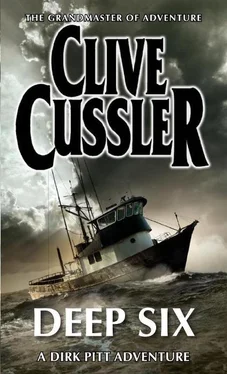The operating room was small, no more than a hundred square feet, and crammed with electronic monitoring equipment. Lugovoy and four members of his surgical team were quietly and efficiently preparing for the delicate operation. Paul Suvorov stood in the only empty corner, looking uncomfortable in a green sterile gown. He watched as one of Lugovoy’s technicians, a woman, pressed a small needle into one side of the President’s neck and then the other.
“Odd place for an anesthetic,” Suvorov remarked.
“For the actual penetration we’ll use a local,” Lugovoy replied while staring at an image-intensified X ray on a video display. “However, a tiny dose of Amytal into the carotid arteries puts the left and right hemispheres of the brain in a drowsy state. This procedure is to eliminate any conscious memory of the operation.”
“Shouldn’t you shave his head?” Suvorov asked, gesturing toward the President’s hair, which protruded through an opening of a metal helmet encasing his skull.
“We must ignore normal surgical procedures,” Lugovoy patiently answered. “For obvious reasons, we cannot alter his appearance in any form.”
“Who will direct the operation?”
“Who do you think?”
“I’m asking you, comrade.”
“I will.”
Suvorov looked puzzled. “I’ve studied your file and the file of every member of the staff. I can almost repeat their contents by heart. Your field is psychology, most of the others are electronic technicians and one is a biochemist. None of you has surgical qualifications.”
“Because we don’t require them.” He dismissed Suvorov and scrutinized the TV display again. Then he nodded. “We can begin now. Set the laser in place.”
A technician pressed his face against the rubber eyepiece of a microscope attached to an argon laser. The machine tied into a computer and displayed a set of coordinates in orange numbers across the bottom of the microscope’s position fixer. When the numbers read only zeros the placement was exact.
The man at the laser nodded. “Position set.”
“Commence,” Lugovoy directed.
A wisp of smoke, so faint that only the laser operator could see it in the microscope, signaled the contact of the imperceptibly thin blue-green beam with the President’s skull.
It was a strange scene. Everyone stood with his back to the patient, watching the monitors. The images were magnified until the beam could be seen as a weblike filament strand. With a precision far above human dexterity, the computer guided the laser in cutting a minute hole one thirtieth of a millimeter in the bone, penetrating only to the membrane covering the brain and its fluid. Suvorov moved closer in rapt fascination.
“What happens next?” he asked hoarsely.
Lugovoy motioned him over to an electron microscope. “See for yourself.”
Suvorov peered through the twin lenses. “All I make out is a dark speck.”
“Adjust the focus to your eyes.”
Suvorov did so and the speck became a chip — an integrated circuit.
“A microminiaturized implant that can transplant and receive brain signals. We’re going to place it in his cerebral cortex, where the brain’s thought processes originate.”
“What does the implant use for an energy source?”
“The brain itself produces ten watts of electricity,” Lugovoy explained. “The President’s brainwaves can be telemetered to a control unit thousands of miles away, translated and any required commands returned. You might say it’s like changing TV channels with a remote control box.”
Suvorov stepped back from the microscope and stared at Lugovoy. “The possibilities are even more overwhelming than I thought,” he murmured. “We’ll be able to learn every secret of the United States government.”
“We’ll also be able to manipulate his days and nights for as long as he lives,” Lugovoy continued. “And through the computer, direct his personality so that neither he nor anyone close to him will notice.”
A technician stepped behind him. “We’re ready to position the implant.”
He nodded. “Proceed.”
A robotlike machine was moved in place of the laser. The incredibly diminutive implant was taken from under the microscope and exactingly fitted into the end of a single slim wire protruding from a mechanical arm. It was then aligned with the opening in the President’s skull.
“Beginning penetration… now,” droned the voice of the man seated at a console.
As with the viewer on the laser, he studied a series of numbers on a display screen. The entire procedure was preprogrammed. No human hand was lifted. Led by the computer, the robot delicately eased the wire through the protective membrane into the soft folds of the brain. After six minutes the display screen flashed, “MARK.”
Lugovoy’s eyes never left the color X-ray monitor. “Release and withdraw the probe.”
“Released and withdrawing,” a voice echoed.
After the wire was removed it was replaced with a miniature tubelike instrument containing a small plug with three hairs and their roots, removed from one of the Russian staff whose head growth closely resembled the President’s. The plug was then inserted into the tiny hole neatly cut by the laser beam. When the robot unit was pulled back, Lugovoy approached and studied the results with a large magnifying glass.
“What little scabbing that transpires should flake away in a few days,” he remarked. Satisfied, he straightened and viewed the computer-directed screens.
“The implant is operational,” announced his female assistant.
Lugovoy massaged his hands in a pleased gesture. “Good, we can begin the second penetration.”
“You’re going to place another implant?” Suvorov asked.
“No, inject a small amount of RNA into the hippocampus.”
“Could you enlighten me in layman terms?”
Lugovoy reached over the shoulder of the man sitting at the computer console and twisted a knob. The image of the President’s brain enlarged until it covered the entire screen of the X-ray monitor.
“There,” he said, tapping the glass screen. “The sea-horse-shaped ridge running under the horns of the lateral ventricles, a vital section of the brain’s limbic system. It’s called the hippocampus. It’s here where new memories are received and dispersed. By injecting RNA — ribonucleic acid, which transmits genetic instructions — from one subject, one who’s been programmed with certain thoughts, we can accomplish what we term a ‘memory transfer.’ “
Suvorov had been furiously storing what he saw and heard in his mind, but he was falling behind. He could not absorb it all. Now he stared down at the President, eyes uncertain.
“You can actually inject the memory of one man into another’s brain?”
“Exactly,” Lugovoy said nonchalantly. “What do you think happens in the mental hospitals where the KGB sends enemies of the state. Not all are reeducated to become good party lovers. Many are used for important psychological experiments. For example, the RNA we are about to administer into the President’s hippocampus comes from an artist who insisted on creating illustrations depicting our leaders in awkward and uncomplimentary poses… I can’t recall his name.”
“Belkaya?”
“Yes, Oskar Belkaya. A sociological misfit. His paintings were either masterpieces of modern art or nightmarish abstractions, depending on your taste. After your fellow state security agents arrested him at his studio, he was secretly taken to a remote sanitarium outside of Kiev. There he was placed in a cocoon, like the ones we have here, for two years. With new memory storage techniques, discovered through biochemistry, his memory was erased and indoctrinated with political concepts we wish the President to implement within his government.”
Читать дальше












